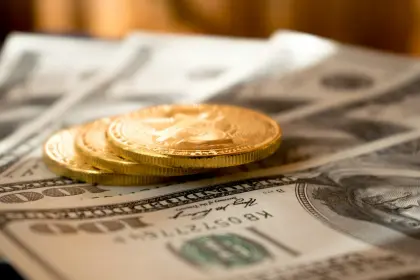Speaker of the US House of Representatives, Mike Johnson, announced on Sunday that he will submit for consideration a bill with more than $60 billion in aid to Ukraine after the Easter recess, which ends on April 9.
However, the package may include “some important innovations,” among which Johnson mentioned the credit terms and the possibility of using frozen Russian assets to finance Ukraine’s recovery.
JOIN US ON TELEGRAM
Follow our coverage of the war on the @Kyivpost_official.
According to Politico, the appropriate legislation may be approved, allowing the Biden administration to confiscate around $5 billion to $8 billion in Russian sovereign assets under US jurisdiction.
The White House has ensured that the bill already approved by the Senate has every chance of gaining bipartisan support in the House of Representatives as well, commenting on Johnson’s proposal for “innovations.”
Kyiv is waiting for any form of US aid to Ukraine
Meanwhile, the Ukrainian parliamentarians in the Verkhovna Rada are currently declining to officially comment on the specifics of the American aid package to Ukraine, such as the time frame and credit terms of its provision, including how it will impact the Ukrainian economy in the short- and long-term, as well as the value of the Ukrainian hryvnia.
“Johnson himself does not know what this aid package will include, what it will look like and when it will be approved. Therefore, to make any predictions is to point one’s finger at the sky,” one of sources in the Verkhovna Rada told Kyiv Post.

Decriminalizing Pornography Degrades ‘Moral Values’ – Ukraine’s Police Chief
Another anonymous source within one of the key Ukrainian parliament committees confirmed that Kyiv will accept American aid, even on credit terms, as they have no other option.
“If it is a loan – we will still take [$60 billion from the United States]. Is it a worse option? Definitely. Will we be able to pay off this loan? It does not matter now. We will still take [it] because we have no choice,” said the Kyiv Post source.
Regarding the use of Russian assets frozen within the United States for assistance to Ukraine, the source said that “there are few Russian assets frozen within the United States that could benefit Ukraine significantly.”
Current economic situation in Ukraine
Danylo Hetmantsev, the Head of the Verkhovna Rada Committee on Finance, Tax and Customs Policy, reported last week that Ukraine’s national debt had increased by over 50 billion dollars during the two years of the full-scale war.
According to him, as of Feb. 29 the total amount of debt reached $143.7 billion, mainly due to the attraction of external official soft loans.
And €50 billion ($53.9 billion) EU aid is among the biggest “soft loans” that Ukraine will have to return over the next 20 years. According to Roksolana Pidlasa, head of the budget committee of Ukraine’s parliament, the main body of this amount will be provided in the form of loans.
“... The EU provides us with non-refundable aid [grants] to cover interest on the loans. So, the money is free for use, but will have to be returned,” Pidlasa said, confirming that Kyiv will return all the €50 billion aid.
You can also highlight the text and press Ctrl + Enter










